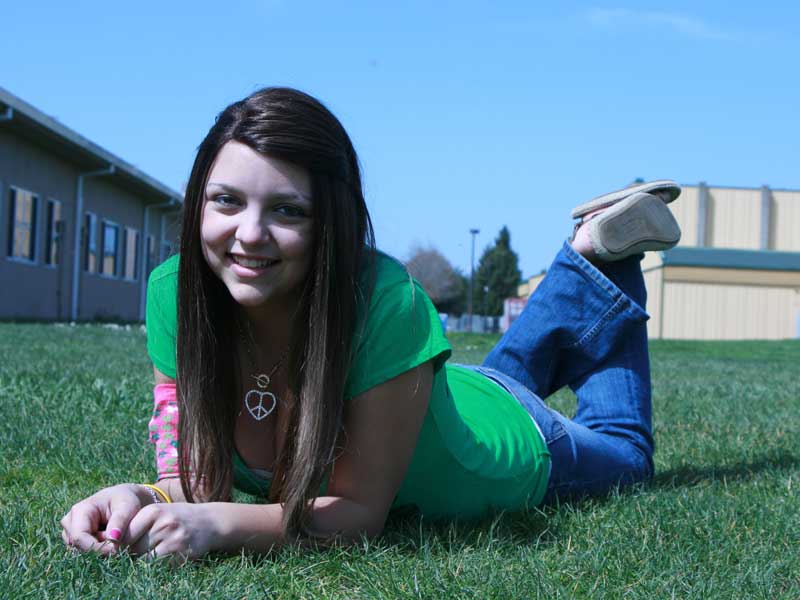By KYLIE BUCK
CASA GRANDE HIGH SCHOOL SENIOR, 17
During her junior year, Katie Murphy was diagnosed with Hodgkin’s lymphoma, a form of cancer.
“Last March I got sick and the doctors thought I had the flu,” Murphy explained. “My lymph nodes got swollen, and they never went down. They began to hurt.”
Doctors performed a fine needle aspiration on Murphy’s lymph node to extract cells. The test results showed that Hodgkin’s lymphoma was a possibility, so Murphy underwent surgery to have one of her lymph nodes removed.

Casa Grande senior Katie Murphy was diagnosed with Hodgkin's lymphoma in March 2009. Photo by Elvis Wong of Casa Grande High School
“I was coming out of a PET/CT scan, and my parents told me we were going to have dinner with my brother. At the end of dinner, my dad blurted out that I had cancer. I was like, ‘Cancer? What?’ and burst into tears,” Murphy said. “It was the scariest moment of my life.”
Murphy often wondered why she was the one with cancer and struggled to accept the diagnosis. But one of her most difficult challenges was telling loved ones.
“I was scared when she told us because of the word ‘cancer,'” said junior Jillian Scannell, Murphy’s friend. “I thought I was going to lose my best friend, but I was reassured. She was so positive.”
Murphy chose Stanford for her treatments. This included chemotherapy once a week for three months and then an additional four weeks of radiation.
“I went to Stanford every day for radiation. It was a hassle, but it’s what I had to do,” Murphy said.
Murphy handled the drugs with relative ease, but she endured weeks of pain.
“There was one week over Christmas break that I felt awful. I stayed in bed for a week and didn’t really eat anything. I felt like I would rather cut my legs off than endure the pain. My parents would rub my legs. I ended up getting a blood transfusion on New Year’s Eve. We got back from Stanford literally 10 minutes before the ball dropped, a great way to spend the New Year,” Murphy laughed.
Her blood count sometimes falls to 5 while a typical one would be 11 or 12. Low blood levels can cause soreness and fatigue and can require blood transfusions. Murphy has had two.
Murphy experienced allergic reactions from the chemo medication, specifically to etoposide. While receiving the drug, she began to feel heaviness in her chest and had trouble breathing. Her face turned red and numbness flooded her ears.
“We pushed the ‘Nurse Call’ button and tons of people came rushing into the room and gave me a lot of Benadryl and Advil. I thought I was going to die,” she said. “They gave me the drug more slowly, but I got a tingling feeling in my fingers, so they gave me an alternative drug, and I didn’t have a reaction.”
Even though Murphy has endured troubling experiences with her treatment, the most difficult trial was giving up what she loved including horseback riding, dancing and hanging out with friends.
“I have to be extremely careful not to get sick. I carry hand sanitizer with me everywhere I go. I use it after I touch a school book — you just don’t know where the germs are. And while I am in treatment my immune system is much weaker,” she said.
Murphy’s friends have supported her and watched her endure the cancer and treatments.
“It’s amazing how strong she’s stayed throughout it. She hasn’t let it hold her back. It hasn’t ruined her life even though she’s dealing with something hard,” said Scannell, who has been a support system for Murphy throughout the treatment. “It’s inspiring how she’s dealt with it. She’s one of the strongest people I know.”
Throughout her experience, Murphy’s most impressive quality has been her strength and persistence. Murphy has maintained a 4.0 GPA and has embraced a sense of openness about her condition while also learning lessons about life and herself.
“I feel like I have become a nicer and better person. I met some people at Stanford when I would go for treatment and they were all so happy and outgoing despite their diagnoses,” she said. “I didn’t know I could be this strong. I’m proud of myself.”
Murphy completed her final radiation treatment on March 22 and has been living in remission since.
